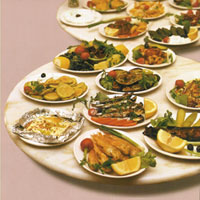Greek AppetizersFor a Greek restaurant, its appetizers,
or starters, ts
kitchen can do. After all, the whole
range of foodstuffs - meat, fish,
vegetables, and dairy products - is
available for use in Greek appetizers.
They range from the simple and refined to
the brilliantly creative, and quite often
reflect the main courses. They can be
eaten hot of cold and may be just the
introduction or the main course itself -
whatever the customer chooses.
 In the cities especially around midday
the great army of office workers is drawn in
little groups to the countless small
restaurants that have opened up in recent
years, hidden among the rows of houses, and
that have now become sought-after addresses.
In the mezedopolio, a shop selling nothing
but mezes as far
as the eye can see, there will certainly be
something to suit every taste. Ouzo,
the Greek anise-flavored schnapps, is a
constant accompaniment to all mezedes.
Drunk with ice, water, or straight, its task
is to reinforce the appetizing sensation
aroused by the mezedes.
"Appetite making" is, after all, the meaning
of the word mezes, which comes from
Turkish. Appetizers certainly do that,
but if you are not careful, they manage to
do something else as well; they make you
feel much too full much too quickly, just
because you are longing to try a bit of
everything. You can always tell
experienced connoisseurs of mezedes
by the restrained way their forks pick up,
say a piece of squid, then a potato, perhaps
an olive next or maybe a small meatball.
In between people chat, break off a piece of
break, sip their glass of ouzo, have a drink
of water, and generally take their time.
Where people dine in groups, all selecting
uninhibitedly from the dishes, something of
the original rural Greece has obviously
survived, as in the past whole villages
would demonstrate and renew their social
solidarity through similar forms of communal
eating. In the cities especially around midday
the great army of office workers is drawn in
little groups to the countless small
restaurants that have opened up in recent
years, hidden among the rows of houses, and
that have now become sought-after addresses.
In the mezedopolio, a shop selling nothing
but mezes as far
as the eye can see, there will certainly be
something to suit every taste. Ouzo,
the Greek anise-flavored schnapps, is a
constant accompaniment to all mezedes.
Drunk with ice, water, or straight, its task
is to reinforce the appetizing sensation
aroused by the mezedes.
"Appetite making" is, after all, the meaning
of the word mezes, which comes from
Turkish. Appetizers certainly do that,
but if you are not careful, they manage to
do something else as well; they make you
feel much too full much too quickly, just
because you are longing to try a bit of
everything. You can always tell
experienced connoisseurs of mezedes
by the restrained way their forks pick up,
say a piece of squid, then a potato, perhaps
an olive next or maybe a small meatball.
In between people chat, break off a piece of
break, sip their glass of ouzo, have a drink
of water, and generally take their time.
Where people dine in groups, all selecting
uninhibitedly from the dishes, something of
the original rural Greece has obviously
survived, as in the past whole villages
would demonstrate and renew their social
solidarity through similar forms of communal
eating.
 The
difference regions of Greece reveal the
characteristics of their cuisine not least
in the selection and preparation of the
typical local mezedes. So the
mezes must definitely be seen as a
kind of ambassador. For example, in
the areas which were once strongly Ottoman,
oriental influences predominate, while a
western fragrance permeate those parts of
the country which were formerly under
Venetian sovereignty. On the Greek
islands, the selection of mezedes is
still determined by what is produced on each
island, and on the mainland, appetizers have
a stronger taste than in the south of
Greece. They whole variety of Greek
mezedes can be seen gathered together in
the big cities, where the host's origins and
the preferences of his regular customers are
the deciding factors. And they are
available from morning till night, because
Greek appetizer culture is a round-the-clock
affair. Mezedes will be
available at any time of the day, even if
you arrive at 11 p.m. The
difference regions of Greece reveal the
characteristics of their cuisine not least
in the selection and preparation of the
typical local mezedes. So the
mezes must definitely be seen as a
kind of ambassador. For example, in
the areas which were once strongly Ottoman,
oriental influences predominate, while a
western fragrance permeate those parts of
the country which were formerly under
Venetian sovereignty. On the Greek
islands, the selection of mezedes is
still determined by what is produced on each
island, and on the mainland, appetizers have
a stronger taste than in the south of
Greece. They whole variety of Greek
mezedes can be seen gathered together in
the big cities, where the host's origins and
the preferences of his regular customers are
the deciding factors. And they are
available from morning till night, because
Greek appetizer culture is a round-the-clock
affair. Mezedes will be
available at any time of the day, even if
you arrive at 11 p.m. |